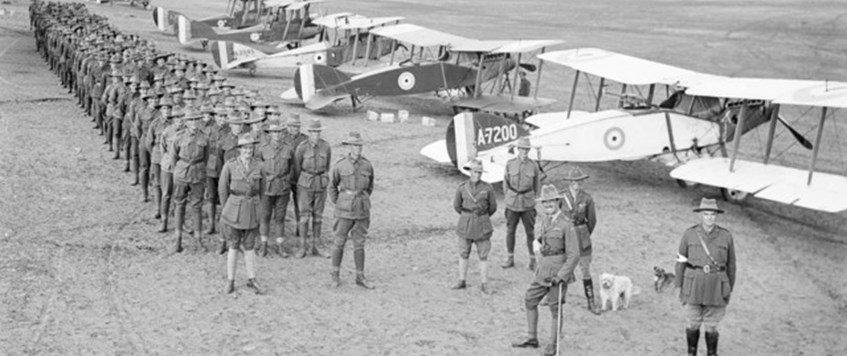
Caption: No 1 Sqdn, Royal Australian Flying Corps
About the talk: As soon as balloons took flight, the military application of both lighter and heavier-than-air aircraft became self-evident. Britain began utilising balloons for military reconnaissance in 1878, they played a role in the Boer Wars. By the 1911 Imperial Conference in London, it was suggested the dominions develop their own independent military aviation capabilities. In 1912 Australia became the first to do so. By 1913 the Central Flying School (CFS) was producing pilots for what became the Australian Flying Corps. During the Great War, it remained fiercely independent of the Royal Flying Corps, despite British attempts at integration. Serving in Mesopotamia, Egypt, Sinai, Palestine, Syria and on the Western Front, Australian pilots played a significant role in reconnaissance, aerial combat and ground attack duties, and the AFC produced several "aces" against both aircraft and in "balloon busting" roles. By war's-end, the AFC had made a major contribution to victory, and its veterans would play a leading role in the development of commercial and medical aviation. In 1921, it was reorganised as the Royal Australian Air Force, making it one of the oldest continuously operating air forces in the world.

About the speaker: Rob (pictured) is an Australian historian, archaeologist and experienced public speaker who has lived in the UK for twenty years. After two years working at the Imperial War Museum, he moved to the National Army Museum where he spent 15 years as a curator and then manager of their Templer Study Centre (library, archive and reading room). He has recently been appointed as the Principal Specialist (Maps) at the National Archives. He specialises in Empire/Commonwealth forces in the world wars, post-colonial legacy, espionage and cartography and is also interested in fortifications and transportation. Rob is an Associate of the Museums Association and a Fellow of the Royal Geographical Society.
This online talk: opens at 19:20 for a 19:30 start, ending at about 20:35. Participating is quick and easy. The only equipment you need is a computer, or a tablet, or a smart phone. Simply email wfa.nwkent@gmail.com for your link and the passcode, which we'll send out on the morning of Sunday 11th May, two days hours before the talk starts. You'll also be automatically be added to the mailing list to keep you updated with future events. You can unsubscribe from this at any time.






